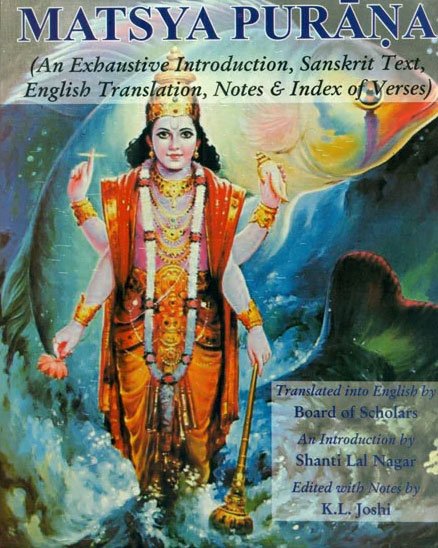The Matsya Purana (critical study)
by Kushal Kalita | 2018 | 74,766 words | ISBN-13: 9788171103058
This page relates ‘Crime and Punishment (danda)’ of the English study on the Matsya-purana: a Sanskrit text preserving ancient Indian traditions and legends written in over 14,000 metrical verses. In this study, the background and content of the Matsyapurana is outlined against the cultural history of ancient India in terms of religion, politics, geography and architectural aspects. It shows how the encyclopedic character causes the text to deal with almost all the aspects of human civilization.
Part 7a - Crime and Punishment (daṇḍa)
The most sacred duty of a king is to punish the wrong doer as established by the ancient Indian texts. The social conducts of human being as laid down in the Dharmaśāstras were strictly followed for living a peaceful life and if one found guilty for breaking those guidelines then the king should punish him for the crime. Along with this, other habits and actions which were against the basic ethics of human being if discharged then that would mark as crime which brings punishment for the doers. This system of administering justice was related with the concept of king, state and government. Almost all the texts dealing with the concept of politics have agreed with the fact that the prosperity and development of a king and the state are definitely dependent on the system of administration of justice and, therefore, the texts have incorporated passages related to crime and punishment.
The Sanskrit equivalent term for punishment is daṇḍa. The word daṇḍa is also regarded as one of the four-fold divisions of diplomacy recommended for a king at the time of necessity by ancient Indian political thinkers, the other three being sāma (conciliation), dāna (gift) and bheda (divide and rule). Here, the term daṇḍa refers to war. But in the present discussion, the topic of daṇḍa will be projected under the subject of punishment only. Punishment is one of the basic elements of judicial administration. The punishment helps people to follow the established rules and regulations of a society and also prevents them from doing a crime. A peaceful environment is very necessary for a healthy living which results in the progressive and all round development of a state in general and of the living beings in particular. The root of this kind of condition lies only in the functioning of the state administration as a whole and particularly in the administration of justice. Judiciary is a part and parcel of administration which imparts justice to the victim of a crime and punishment to the guilty.
The Matsyapurāṇa has said that a king should impose punishment after proper discussion with his wise ministers according to the Dharmaśāstras.[1] If he punishes the innocent and the guilty is not punished by him then the king loses his kingdom and goes to hell. That is why the king should be cautious and take utmost care in administering punishment and at the same time should abide by the ethics of Dharmaśāstras.[2] The king should give proper punishment both in his own country and outside the country. Punishment should not be made to anchorites, virtuous and person with expertise in Dharmaśāstras.[3] It is advocated in the Matsyapurāṇa that if a king is not strict in imparting punishment then the children, the old, saints, brāhmaṇas and widows will become subject to be dominated by the strong persons just as the small fish is swallowed by the bigger one in the sea.[4] Rightly marked in the Matsyapurāṇa that it is punishment which governs and protects the subjects. Due to the fear of punishment sinners abstain from doing sin.[5] So, punishment must be imposed reasonably by them who have the power of using it. Punishments include fine, death, physical torture etc.
Footnotes and references:
[1]:
samyak praṇayanaṃ tasya tathā kāryaṃ mahīkṣitā/ dharmaśāsrānusāreṇa sasahāyena dhīmatā// Ibid., 225.2
[2]:
adaṇḍyān daṇḍayedrājā daṇḍyāṃścaivāpyadaṇḍayan/ iha rājyātparibhraṣṭo narakañca prapadyate// tasmādrājñā vinītena dharmaśāstrānusārataḥ/ daṇḍapraṇayanaṃ kāryaṃ lokānugrahakāmyayā// Ibid., 225.6-7
[3]:
vānaprasthāṃśca dharmajñānnirmamānniṣparigrahān// svadeśe paradeśe vā dharmaśāstraviśāradān/ Ibid., 225.3-4
[4]:
